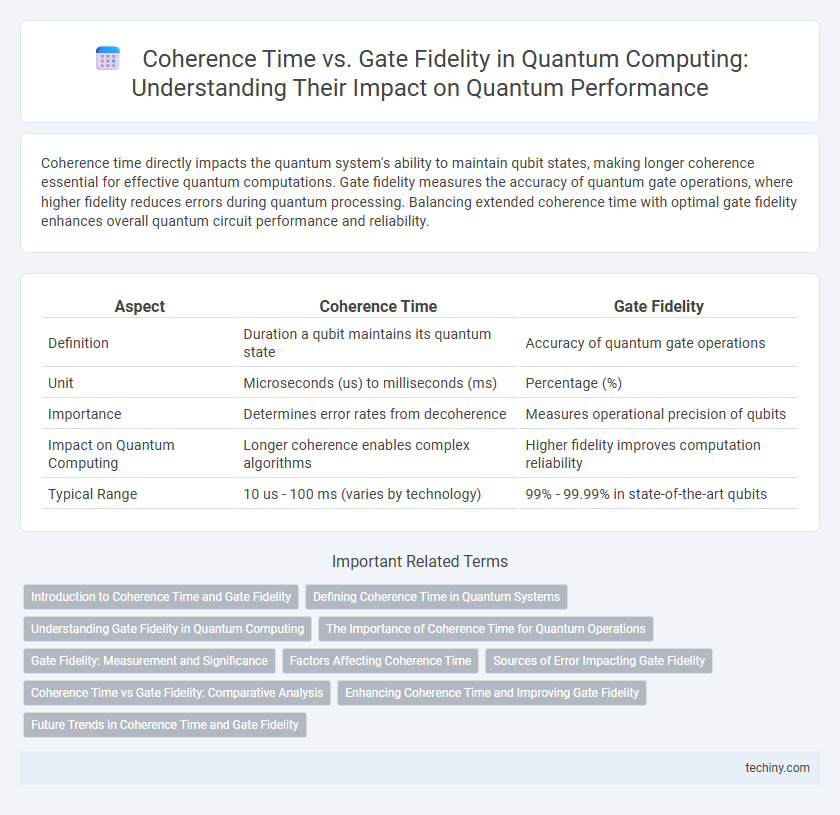Coherence time directly impacts the quantum system's ability to maintain qubit states, making longer coherence essential for effective quantum computations. Gate fidelity measures the accuracy of quantum gate operations, where higher fidelity reduces errors during quantum processing. Balancing extended coherence time with optimal gate fidelity enhances overall quantum circuit performance and reliability.
Table of Comparison
| Aspect | Coherence Time | Gate Fidelity |
|---|---|---|
| Definition | Duration a qubit maintains its quantum state | Accuracy of quantum gate operations |
| Unit | Microseconds (us) to milliseconds (ms) | Percentage (%) |
| Importance | Determines error rates from decoherence | Measures operational precision of qubits |
| Impact on Quantum Computing | Longer coherence enables complex algorithms | Higher fidelity improves computation reliability |
| Typical Range | 10 us - 100 ms (varies by technology) | 99% - 99.99% in state-of-the-art qubits |
Introduction to Coherence Time and Gate Fidelity
Coherence time measures how long a qubit can maintain its quantum state before decoherence occurs, directly impacting the stability and reliability of quantum computations. Gate fidelity quantifies the accuracy of quantum gate operations in manipulating qubits without errors, reflecting the precision of quantum logic gates. Optimizing both coherence time and gate fidelity is essential for enhancing the performance and scalability of quantum computers.
Defining Coherence Time in Quantum Systems
Coherence time in quantum systems refers to the duration over which a qubit maintains its quantum state without significant decoherence, directly impacting the reliability of quantum computations. Longer coherence times allow quantum gates to operate with higher fidelity by minimizing errors caused by environmental interactions and noise. Optimizing coherence time is crucial for enhancing gate fidelity, thereby improving the overall performance and scalability of quantum processors.
Understanding Gate Fidelity in Quantum Computing
Gate fidelity in quantum computing measures the accuracy of quantum gate operations, reflecting how closely the actual gate matches the ideal unitary transformation. High gate fidelity is crucial for minimizing errors and maintaining quantum state integrity during computations. While coherence time represents the duration qubits maintain their quantum state, gate fidelity directly impacts the reliability of logic operations, making it a key parameter for scalable quantum error correction.
The Importance of Coherence Time for Quantum Operations
Coherence time directly impacts the reliability of quantum operations by determining how long qubits maintain their quantum states before decoherence disrupts computation. Longer coherence times allow for the execution of more complex gate sequences with higher gate fidelity, ensuring accurate and stable quantum processing. Maintaining optimal coherence time is crucial for scaling quantum algorithms and achieving practical quantum advantage.
Gate Fidelity: Measurement and Significance
Gate fidelity quantifies the accuracy of quantum gate operations by comparing the implemented quantum gate to the ideal one, with values close to 1 indicating near-perfect performance. High gate fidelity is crucial for reducing computational errors and enabling reliable quantum algorithms, directly impacting error correction thresholds and fault tolerance. Measurement techniques commonly involve randomized benchmarking and quantum process tomography, providing insights into noise sources and operation quality essential for advancing quantum processor development.
Factors Affecting Coherence Time
Coherence time in quantum computing is primarily influenced by environmental noise, material defects, and temperature fluctuations, which cause qubit decoherence and loss of quantum information. Improving coherence time requires minimizing these disturbances through advanced materials, error correction techniques, and cryogenic environments. Gate fidelity depends on coherence time because longer coherence allows more reliable gate operations before decoherence degrades qubit states.
Sources of Error Impacting Gate Fidelity
Quantum computing gate fidelity is significantly influenced by errors arising from decoherence, control inaccuracies, and environmental noise. Coherence time limits the duration a qubit maintains its quantum state, directly affecting the probability of error during gate operations. Errors caused by qubit relaxation, dephasing, and crosstalk between qubits degrade gate fidelity, making the management of these sources crucial for reliable quantum computations.
Coherence Time vs Gate Fidelity: Comparative Analysis
Coherence time and gate fidelity are critical parameters in evaluating quantum computing performance, where coherence time measures how long a qubit maintains its quantum state and gate fidelity quantifies the accuracy of quantum gate operations. Longer coherence times enable more quantum operations before decoherence errors accumulate, while higher gate fidelity reduces gate errors during computation, both directly impacting computational reliability. Comparative analysis reveals optimizing coherence time often involves hardware improvements like advanced materials and cryogenic environments, whereas enhancing gate fidelity requires refined control pulses and error correction protocols to minimize operational errors.
Enhancing Coherence Time and Improving Gate Fidelity
Enhancing coherence time in quantum computing involves minimizing environmental noise and implementing advanced error correction techniques to maintain qubit stability and reduce decoherence effects. Improving gate fidelity requires precise control of quantum gates through optimized pulse shaping, calibration protocols, and leveraging materials with low noise properties to execute accurate quantum operations. Advances in materials science, cryogenic technology, and qubit design synergistically contribute to both increasing coherence times and achieving higher gate fidelities, essential for scalable quantum processors.
Future Trends in Coherence Time and Gate Fidelity
Future trends in quantum computing emphasize extending coherence time through advanced error correction techniques and novel qubit materials such as topological qubits, which offer increased stability. Enhancements in gate fidelity are driven by refined control mechanisms and improved calibration protocols, aiming to minimize gate errors below the fault-tolerant threshold for scalable quantum processors. Integration of machine learning algorithms in hardware design and noise mitigation also contributes to simultaneously boosting coherence time and gate fidelity, accelerating practical quantum advantage.
Coherence Time vs Gate Fidelity Infographic

 techiny.com
techiny.com